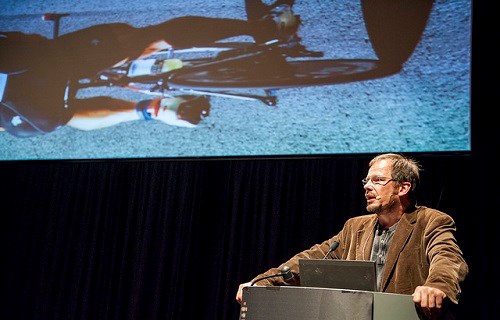Sports federations: Still acting as doping facilitators?

Criticism of Russian sports federations can lead to “really bad problems” for critics, says Hajo Seppelt, who has created a documentary relvealing systematic doping in Russian athletics. Seppelt was speaking in the Aarhus Music Hall during Play the Game 2015. Photo: Thomas Søndergaard/Play the Game
26.10.2015
By Marcus HoyFrédéric Donzé, Director of WADA's European Regional Office, told Play the Game delegates that the new code placed more emphasis on effective testing and optimal storage of samples, and a ten-year statute of limitation had replaced the former eight-year period. The new code included longer periods of ineligibility with more flexibility in sanctions, he said, and increased focus on both education and athletes’ entourages. A new requirement for national authorities to formulate doping risk assessment plans would also be introduced, he said, which would improve the security of samples.
Structural inadequacies
In a presentation entitled ‘Doping must be tackled at the source; the rest is appearance’, Italian doping investigator Allesandro Donati described what he saw as WADA’s structural inadequacies. While WADA’s Anti-Doping Code places specific obligations on athletes, doctors and coaches, he said, recent cases demonstrate that national and international sports institutions should be subject to more stringent obligations. In the worst cases, he said, sports institutions have worked against the aims of WADA in protecting doping users. The recent controversy related to abnormally high blood values that were detected by the International Association of Athletics Federations (IAAF) showed that many athletes were probably still beating the system, he said.
While WADA has good intentions, Donati said it is hampered by “huge limits in its competency and authority”, especially regarding the responsibilities it places on sports institutions. In some countries, he pointed out, national anti-doping agencies are directly dependent on the national sports institutions and therefore “deprived of autonomy and impartiality”. In other nations, agencies are autonomous only in appearance. When federations speak of defending their independence, he said, this usually means their political and commercial interests.
Donati quoted Former IOC Ethics Commission member Edwin Moses, who pointed to the “inherent conflict of interest that exists” when a sport is tasked with both policing and promoting itself. This, Moses said, is “especially true when those actions may damage the image of the sport or a profitable, high profile athlete. We have seen these conflicting interests play out time and time again, all to the detriment of clean athletes”, he said.
A positive step, Donati said, would be the introduction by nations of criminal anti-doping laws, which would mean that public prosecutors, magistrates and the police would all become powerful allies of WADA.
Massive failures and ignorance
Michael Ask, CEO of Anti Doping Denmark, told Play the Game delegates that a recent report on doping in a successful Danish cycling team found evidence of “massive failures and ignorance” from the team’s administrators, who included discredited Tour de France winner, Bjarne Riis. On occasions, the report found, the administrators actually delivered doping substances to the team, which has been known as both Jack and Jones and CSC Tiscali. One of the team’s riders, Michael Rasmussen, gave extensive evidence to the enquiry and in return saw his doping suspension was reduced from eight years to just two.
The report concluded that a number of factors increase the risk of drug abuse in cycling in particular. It proposed that blood values not always be disclosed to athletes directly after testing, cycling teams strive to be less dependent on single sponsors, and a new “fit for purpose” licensing system be applied to sports directors and team doctors.
The following question and answer session saw Rasmussen, who was in the audience, asked whether changes to the rules of the Tour de France, such as shortening the stages, might reduce the attractiveness of illegal performance-enhancers. He was sceptical about whether any structural changes would reduce doping incentives.
Whistleblowers in hiding
Hajo Seppelt, a freelance journalist working for Germany’s ARD/ ZDF TV stations, named Yuliya and Vitali Stepanov as two of the “greatest whistleblowers in the history of sport”. The couple, a Russian anti-doping administrator and an athlete, were forced to flee their home country after revealing systematic doping in Russian athletics, and a cover-up involving IAAF officials.
His TV documentary, Geheimsache Doping ("Top Secret Doping") alleged that top Russian administrators at the IAAF knew about and facilitated doping practices. Much of the evidence was gathered by Stepanova, who secretly recorded numerous audio and video conversations. A second documentary detailed the follow-up by the IAAF and the Russian authorities, which continues to deny all the allegations.
Russia, Seppelt, said, has had a systemic doing problem dating back to former Soviet Union times. Criticism of Russian sports federations can lead to “really bad problems” for critics, he said, and Yuliya and Vitali Stepanov had no option but to leave the country. The outcome of an official WADA investigation into Russian doping would be published in the next couple of weeks, he said, and the couple is currently residing in an undisclosed location outside Russia.
-
Edward Albert,
New York,
28.10.2015 13:34:
As a member of the Board of Directors of the United States Bicycling Hall of Fame, and Chair of its committee on Ethics and PES, I find it amazing that confessed substance abusers continually find their way onto the media as commentators for major cycling events such as the Tour de France. Never a word is uttered about their past. it is as if it never happened.





